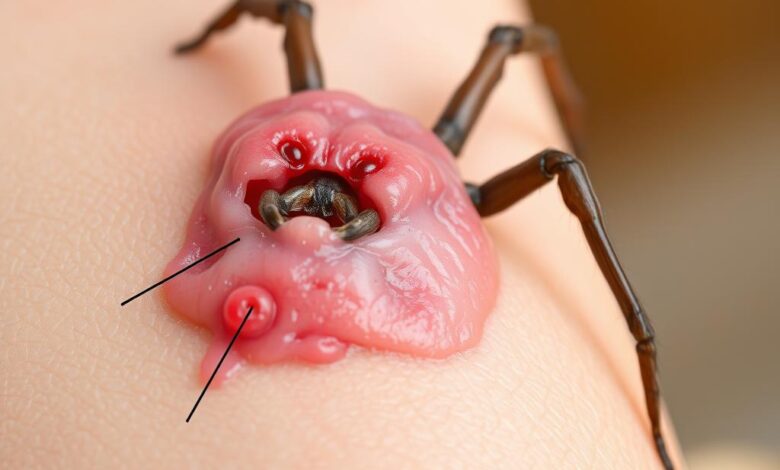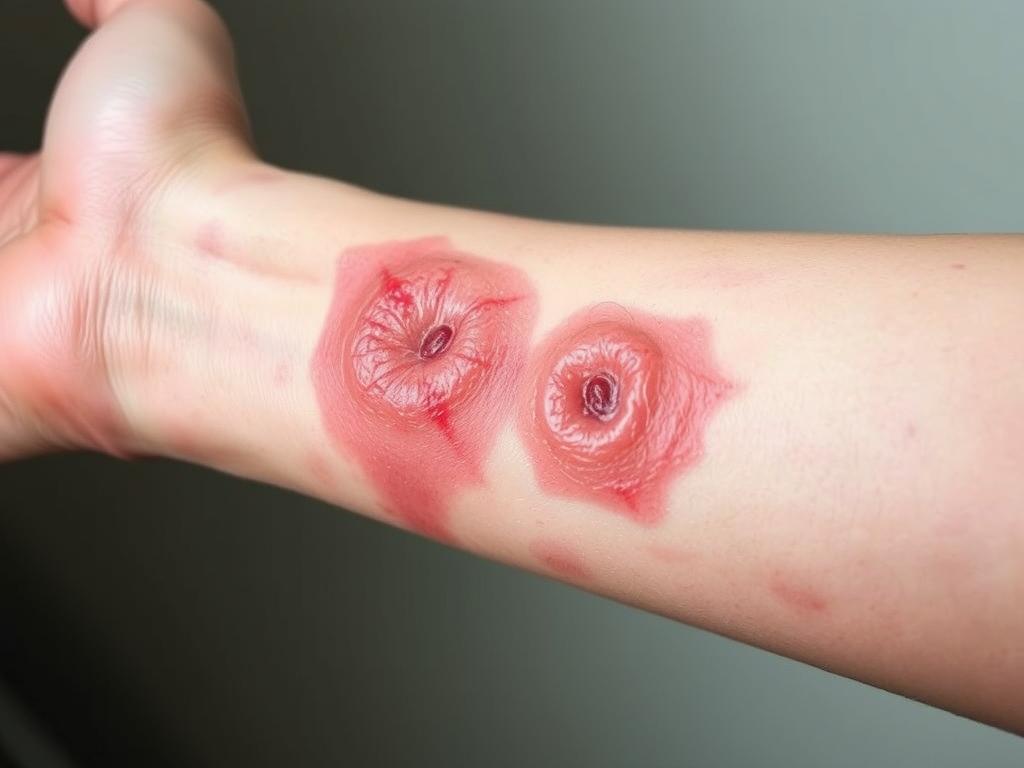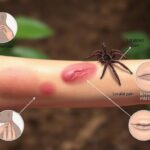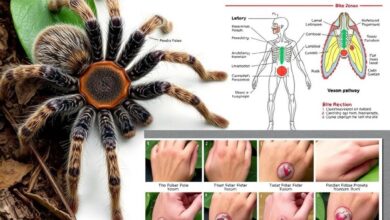When to Seek Medical Help after a Tarantula Bite

Do you know the dangers of a tarantula’s bite? With over 168 types of these spiders, each has its own venom. It’s key to know when to get medical help after a tarantula bite. These bites can cause symptoms from mild to severe, making quick action important for safety.
In places like Costa Rica, tarantulas can be huge, over 20 cm long. With almost 40 species there, the chance of a venomous bite is higher. Knowing what to do after a tarantula bite is crucial. It can prevent a bad situation from becoming worse.
Understanding the signs of a tarantula bite is vital. If you feel pain, swelling, or have trouble breathing, get help fast. Remember, some tarantulas are more dangerous than others, so it’s best to be safe.
Here’s a quick guide to help you:
| Symptoms | Action |
|---|---|
| Pain or itching at the bite site | Clean the area with soap and water |
| Swelling or redness | Apply a cold compress to reduce swelling |
| Difficulty breathing or rapid heartbeat | Call emergency services immediately |
| Nausea or dizziness | Stay calm and seek medical help |
Remember, if you’re bitten by a tarantula, act fast. Even if the bite seems mild, it’s better to be safe. Always seek medical help if you’re unsure about the severity of the bite.
What Are the Symptoms of a Tarantula Bite?
Tarantula bites can be painful and cause reactions. Knowing the tarantula bite symptoms and tarantula venom effects helps you know when to get medical help.
Local Reactions
At the bite site, you might see:
- Pain – The bite hurts a lot, feeling like burning or stinging.
- Redness – The area turns red and gets inflamed.
- Swelling – Swelling happens around the bite.
- Itching – The bite makes you itch a lot.
Systemic Reactions
Some people get reactions all over their body, like:
- Nausea – You might feel sick or throw up.
- Muscle Cramps – The venom causes muscle cramps.
- Sweating – You sweat a lot.
- Difficulty Breathing – In bad cases, breathing gets hard.
How bad the symptoms are can depend on the tarantula type and your body’s reaction. If symptoms are severe or worrying, get medical help right away.

 Common Symptoms of Tarantula Bites
Common Symptoms of Tarantula Bites
When to Seek Help Tarantula Bite
If you’ve been bitten by a tarantula, get medical help right away, even if it doesn’t seem bad. Tarantula bite treatment and tarantula bite first aid are key to avoid serious issues from a tarantula bite emergency.
Go to the hospital right away if you have any of these bad symptoms after a tarantula bite:
- Difficulty breathing
- Severe pain or swelling
- Nausea or vomiting
- Dizziness or confusion
- Rapid heartbeat
Quick medical care can help with the bite and stop serious problems. While waiting for help, you can do some first aid like:
- Wash the bite area with soap and water
- Apply a cold compress to reduce swelling and pain
- Avoid scratching or rubbing the bite site
Don’t try to treat a serious tarantula bite by yourself. Getting professional tarantula bite treatment is key for your safety and health.
Even if the bite looks minor, it’s best to be safe and get medical help. Your health and safety are most important.
Tarantula Species with Medically Significant Venom
Not all tarantulas are a threat to humans. Some, like the “ornamental tree spiders” or “tiger spiders” in the Poecilotheria genus, have venom that can cause serious health issues.
These tarantulas are found in Asia and parts of the United States. If bitten, they can cause a lot of pain, swelling, and other problems. You should get medical help right away.
| Tarantula Species | Venom Potency | Geographic Distribution |
|---|---|---|
| Poecilotheria spp. (Ornamental Tree Spiders) | Medically Significant | Asia, parts of the United States |
| Theraphosa blondi (Goliath Birdeater) | Mild | South America |
| Aphonopelma spp. (North American Tarantulas) | Mild | North America |
Knowing which tarantulas in your area have dangerous venom is key. This helps you stay safe and get help fast if bitten.
First Aid for Tarantula Bites
If you’ve been bitten by a tarantula, get medical help right away. Tarantula bites are usually not dangerous to humans. But, there are steps you can take to ease the pain and manage the bite.
Start by washing the bite area with soap and. This cleans the wound and lowers the chance of infection. Then, use a cold compress or ice pack on the bite for 10-15 minutes to lessen swelling and pain.
 Preventing Infections after a Tarantula Bite
Preventing Infections after a Tarantula Bite
Don’t try to suck out the venom or use a tourniquet. These actions can make things worse. Stay calm, watch for symptoms, and get medical help quickly.
While waiting for a doctor, you can take pain relievers like acetaminophen or ibuprofen. Antihistamines can also help with swelling and allergic reactions.
Remember, tarantula bite first aid means basic care and quick medical help. Don’t try to treat the bite by yourself. It could get worse and become dangerous. Getting the right tarantula bite treatment is key for your safety.
Potential Complications from Tarantula Bites
Most tarantula bites cause mild reactions. But, some can lead to severe issues, especially if the tarantula is venomous. Tarantula bite complications may include intense pain, swelling, nausea, vomiting, trouble breathing, and rarely, death. The severity depends on how the body reacts to the venom and the tarantula type.
A big worry is getting a serious illness from mosquitoes, like Eastern equine encephalitis (EEE), West Nile virus, or St. Louis. These viruses can come from infected mosquitoes that are drawn to the bite area. Managing the tarantula bite pain is key to avoid secondary infections.
Getting medical help right away is crucial to handle the bite and prevent serious problems. If you have severe pain, swelling, trouble breathing, or other worrying signs after a tarantula bite, go to the hospital. Quick action can reduce the risk of serious issues and help you recover fully.
In some cases, a tarantula bite severity might need hospital care and close monitoring. Treatment usually includes managing pain, swelling, and breathing problems. Sadly, there’s no cure or vaccine for illnesses from mosquito bites after a tarantula bite.
Knowing the risks and getting medical help fast can make a big difference for those bitten by tarantulas. By understanding the dangers and acting quickly, you can lower the risk of severe problems from a tarantula bite.
When to Seek Emergency Medical Attention
If you have a severe or worrying symptom after a tarantula bite, get help right away. Look out for trouble breathing, a lot of pain, big swelling, feeling sick, or throwing up. These signs mean the bite might be serious and you need quick medical help.
Don’t try to treat a bad tarantula bite by yourself. It can get worse fast and be dangerous. Call for an ambulance or go to the hospital quickly. This is the safest way to take care of yourself and avoid serious problems.
 Treating Allergic Reactions to Tarantula Bites
Treating Allergic Reactions to Tarantula Bites
Your health is the most important thing after a tarantula bite. If you’re worried or have bad symptoms, get medical help right away. Acting fast and getting help is key to getting better and avoiding complications.


